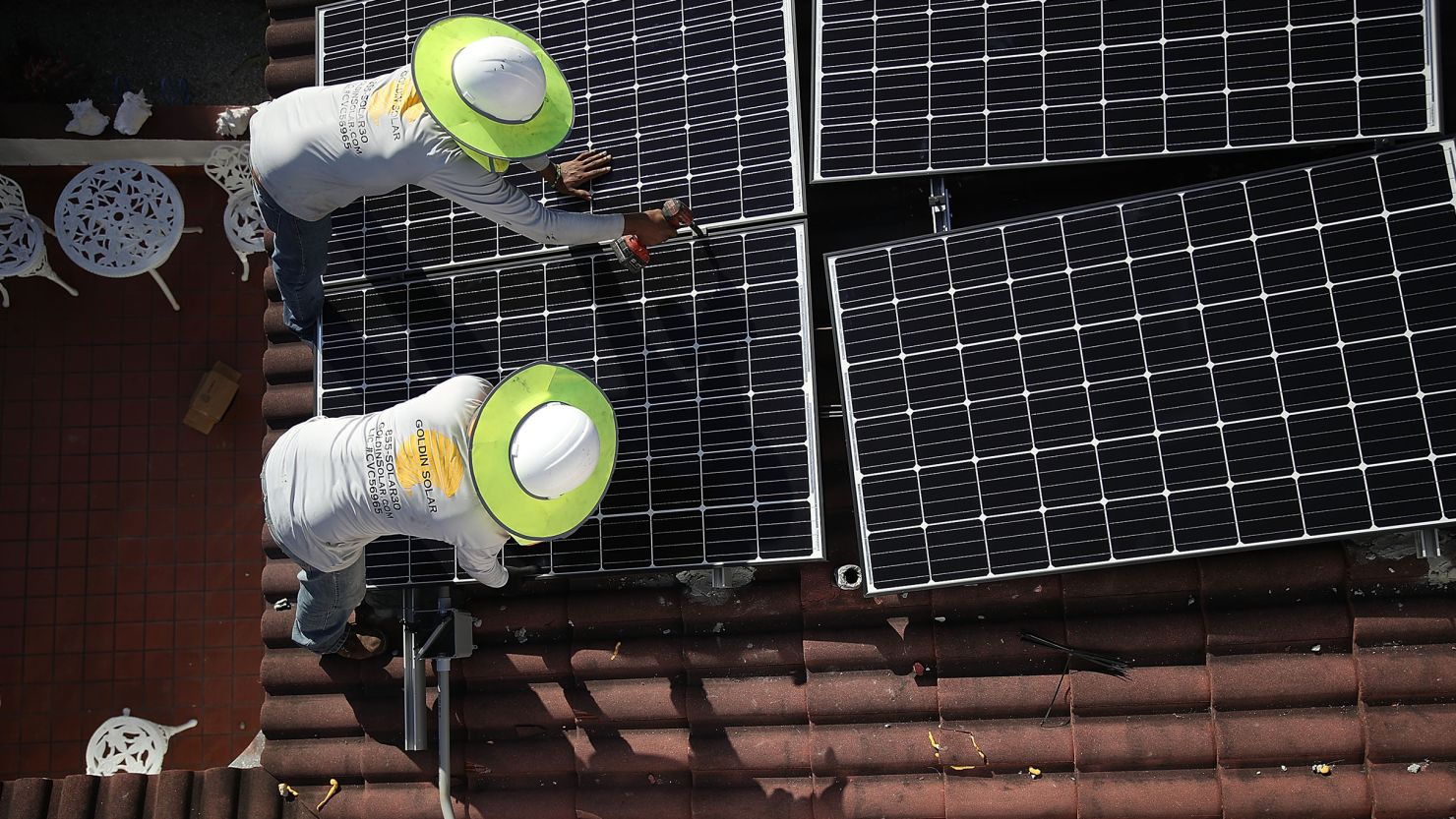A large majority of Americans say the US should prioritize developing renewable energy, but remain wary of transitioning off fossil fuels entirely, according to new polling from Pew Research Center.
The survey of 10,237 US adults was conducted weeks before Russia invaded Ukraine, which has increased energy costs around the world and raised concerns over energy security and reliance on fossil fuels.
The results show 69% of American adults favor developing alternative energy, including wind and solar, over increasing production of fossil fuels like oil, coal and natural gas. It also found 69% of Americans want the US to take steps to become carbon neutral by 2050 – as President Joe Biden is seeking to do.
That being said, most Americans don’t support phasing out fossil fuels completely, and the polling shows a partisan split on the issue. Just 31% of Americans want the US to completely phase out fossil fuel use, while 67% say the country should use a mix of renewable energy and fossil fuels.
Pew researchers found that while there’s some concern that a renewable energy transition would lead to higher costs for everyday goods, 59% of respondents said they thought the prices they paid to heat and cool their homes would either improve or stay the same, compared to 39% who thought it would get worse.
The poll didn’t directly ask whether respondents would be willing to pay more for renewable energy.
“There’s particular concern around prices,” Alec Tyson, a lead author on the poll, told CNN. “Slightly more [respondents] think the impact of this shift would make prices of everyday goods worse, not better.”
People participated in the poll via a self-administered web survey. If participants didn’t have access to internet, a tablet with wireless access was provided. The margin of error on the poll was plus or minus 1.5 percentage points.
The poll comes a day after the release of a major UN-backed climate report that found that the impacts of burning fossil fuels for energy were larger than previously thought, and humans and ecosystems are running out of ways to adapt to the climate crisis. The report’s authors said the impacts are happening much faster and are more disruptive and widespread than scientists expected 20 years ago.
The poll found 72% of respondents said a clean energy transition would not happen quickly enough to prevent “severe problems from climate change.” Pew found majorities from both parties – 85% of Democrats and Democratic leaners as well as 58% of Republicans and Republican leaners – believed the energy transition wouldn’t happen fast enough.
In this State of the Union address on Tuesday, Biden “will call on Congress to deliver on a legislative agenda for clean energy and climate action that has overwhelming support from the American people – Republicans, Democrats and independents,” a senior administration official said.
More specifically, he is expected to ask for for renewed investment in and tax credits for domestic energy manufacturing and deployments, steps the administration says could save Americans an average of $500 a year in energy costs. He will also address the crisis in Ukraine, which has driven up the price of oil and gasoline.
Pew researchers say that partisan affiliation “remains the dominant divide” for US adults in their views of climate and energy issues. Very large majorities of Democrats and Democratic-leaning independents want the US to prioritize renewable development, while Republicans and Republican-leaning independents tend to favor expanding fossil fuel production. However, the GOP is not monolithic when it comes to energy issues.
Pew researchers found disagreement in the party when it came to the question of the US becoming carbon neutral: 66% of self-described moderate and liberal Republicans favor taking steps toward carbon neutrality, while 64% of conservative Republicans opposed it. Pew found a similar divide when asking Republicans whether the US should prioritize renewables over fossil fuel development: 64% of moderate and liberal Republicans said the country should be developing alternative sources like wind and solar, while 67% of conservative Republicans favored expanding fossil fuel production.
Wind and solar development are particularly popular; 72% of US adults said the federal government should encourage wind and solar production, compared to 51% who said the government should encourage the use of electric vehicles, 35% who said it should encourage nuclear power, 33% who said it should encourage oil and gas drilling. Less than 20% said the federal government should encourage coal mining.






